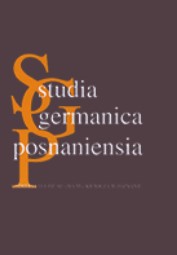„BITTE BETRACHTEN SIE MICH ALS EINEN TRAUM.“ SPRACHE UND IDENTITÄT IN HAMID SADRS GESPRÄCHSZETTEL AN DORA
“BITTE BETRACHTEN SIE MICH ALS EINEN TRAUM“. LANGUAGE AND IDENTITY IN HAMID SADRS GESPRÄCHSZETTEL AN DORA
Author(s): Peter ClarSubject(s): Other Language Literature, Contemporary Philosophy, Theory of Literature
Published by: Uniwersytet Adama Mickiewicza
Keywords: Jacques Derrida; Jacques Lacan; Paul de Man; deconstruction; autobiography; prosopopoeia;
Summary/Abstract: According to Derridas Monolingualism of the Other, Or, The Prosthesis of Origin every person is always multilingual. If we understand this state of non-monolingualism as a general human phenomenon, which the so called ‘exophone literature’ particulary helps us to do, then we understand that to question a stranger’s alienation always means to question our own alienation at the same time. Thus the question of the stranger becomes the question of one‘s own identity. In my article, I analyze this phenomenon by combining Hamid Sadr’s ‘novel’ Gesprächzettel an Dora (1994) and Jacques Derrida’s concept of mono- and multilingualism. In Hamid Sadr’s text the narrator uses egodocuments to invent a truth about Franz Kafka’s death which opposes many literary scholars and biographers who have interpreted Kafka’s death as a consequence of his existence as a poet, his diremption etc. What alienates the literary figure named Kafka from us is the language itself, and first of all the combination of allegedly ‘authentic’ documents with the unreliable narrative voices, thus revealing the constructiveness of ‘Kafka’. The main character Kafka – who within the text is named K., Kafka, kavka and who is introduced into the text by using his ‘own’ words, that supposedly precede him and yet, at the same time, succeed him – is deconstructed. Borders between cause and effect, before and after, reality and fiction, life and death become obsolete thus turning the Kafka/K. figure into a wanderer, a figure of ‘both-and’. Kafka’s situation as a stranger, as a kind of exile in the remoteness of the sanatorium, is not alone a parable on the situation of an exile, as Sadr’s personal life may indicate. Moreover, as I will show, it is a metaphor for human identity in general.
Journal: Studia Germanica Posnaniensia
- Issue Year: 2019
- Issue No: 40
- Page Range: 129-138
- Page Count: 10
- Language: German

